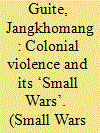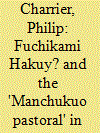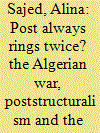|
|
|
Sort Order |
|
|
|
Items / Page
|
|
|
|
|
|
|
| Srl | Item |
| 1 |
ID:
165199


|
|
|
|
|
| Summary/Abstract |
This paper concerns the lesser known British counterinsurgency (COIN) operations in Northeast frontier of India during the First World War. Officially known as the ‘Kuki Operations’, it was considered as part of the Great War. Carried out in isolation from press and public, and shelved in colonial archives, the event remained invisible until today. Yet, it registers a critical case of colonial COIN doctrine where the ‘moral effect’ doctrine was employed without being questioned. It unleashed enormous amount of organized violence, ranging from shoot at sight to indiscriminate burning of villages, wholesale destruction of property and livestock, prevention of cultivation and rebuilding of villages, forced mass displacement in jungles or in ‘concentration camps’, and collective punishment (communal penal labour and payment of compensation) after the war. This paper argues that the theory of ‘minimum force’ and the practicability of the ‘moral effect’ doctrine as applied by the Empire, sit oddly with each other at the frontier, where violence was seen both as a natural and moral orders. Violence as an ‘imperatively necessary’ method to bring order in a disorderly frontier, in the opinion of colonial state, informs and registers Northeast India as geography of violence.
|
|
|
|
|
|
|
|
|
|
|
|
|
|
|
|
| 2 |
ID:
102874


|
|
|
| 3 |
ID:
133471


|
|
|
|
|
| Publication |
2014.
|
| Summary/Abstract |
The art photography of Fuchikami Hakuy? and his circle in Japanese Manchuria is commonly and benignly treated as hybridized modernism, a product of the bending of conventional 1930s Japanese styles (pictorialist, constructivist, realist) through contact with the unfamiliar and the exotic. As such it is deemed reflexive in relation to the stimuli of a new land and peoples, but disconnected from the political, economic, and social processes of imperialism and colonialism in Northeast China. The following article uses both structuralist and post-structuralist theoretical approaches to challenge this interpretation, arguing that through the skilful erasure of colonial violence and disruption, the lyrical images of villages, agriculturalists, and factories produced by Fuchikami and his Mansh? Shashin Sakka Ky?kai (Manchuria Photographic Artists Association) participate directly in processes of state construction in Manchukuo. The development of a quasi-documentary pastoral aesthetic by Fuchikami and the Manchuria photographers is given close attention in the analysis, particularly as it relates to the influence of French Barbizon school painting on late nineteenth- and early twentieth-century Japanese art.
|
|
|
|
|
|
|
|
|
|
|
|
|
|
|
|
| 4 |
ID:
117838


|
|
|
|
|
| Publication |
2012.
|
| Summary/Abstract |
This article makes the case for rethinking the relation between poststructuralism and postcolonialism, by building on the claims advanced by Robert Young, Azzedine Haddour and Pal Ahluwalia that the history of deconstruction coincides with the collapse of the French colonial system in Algeria, and with the violent anti-colonial struggle that ensued. I choose to examine narratives of theorists such as Derrida, Lyotard, and Cixous because not only they provide the link between colonial violence, the poststructuralist project that ensued, and postcolonialism, but also because the problems I identify with their projects are replicated by much poststructuralist work in International Relations (IR). I signal that one of the most significant consequences of conducting poststructuralist research without attention to postcolonial horizons lies in the idealisation of the marginalised, the oppressed or the native without attending to the complexity of her position, voice or agency. Bringing these theories together aims to highlight the need for a dialogue, within IR, between poststructuralism's desire to disrupt the disciplinarity of the field, and postcolonialism's potential to transcend the self-referential frame of IR by introducing perspectives, (hi)stories, and voices from elsewhere.
|
|
|
|
|
|
|
|
|
|
|
|
|
|
|
|
|
|
|
|
|